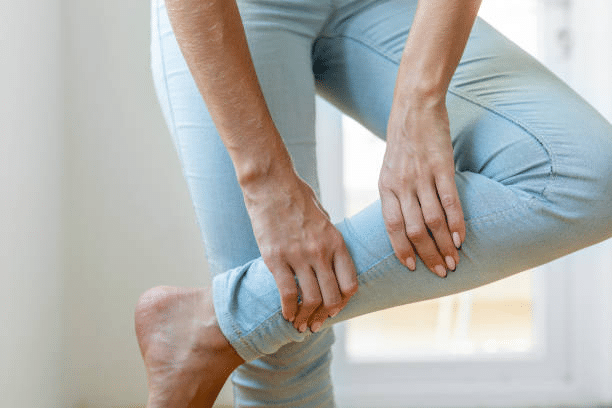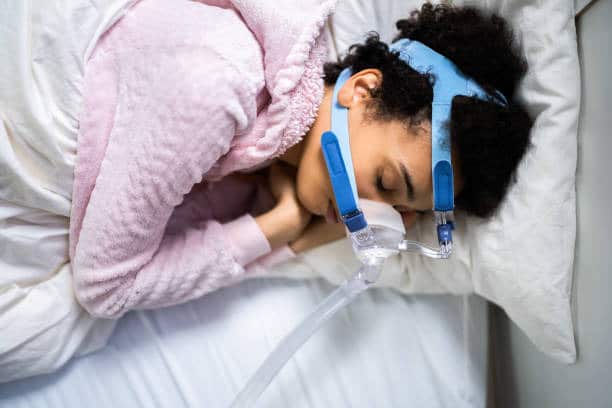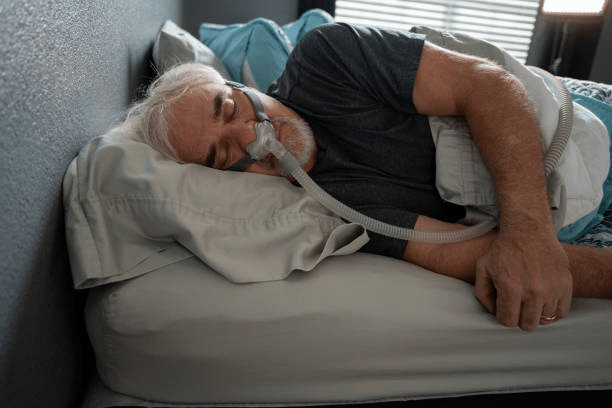RLS is a neurological condition marked by an overwhelming need to move the legs. Often occurring during inactivity or at night, it may cause sleep disturbances and daytime tiredness.
CPAP therapy is a frequent treatment for obstructive sleep apnea, a disease in which an individual’s airway closes while sleeping. CPAP treatment requires a mask that distributes pressured air to maintain an open airway during sleep. Even though RLS patients have a high rate of sleep apnea, there is some evidence that CPAP treatment may help.
This article will examine the association between restless legs syndrome (RLS) and sleep apnea and the possible advantages of CPAP treatment for RLS.
Understanding Restless Leg Syndrome (RLS)

Over 10% of the general population suffers from RLS, which is more common in women and elderly people. The intensity of RLS symptoms might vary, but they may include the following:
- An urge to move the legs that are often accompanied by uncomfortable feelings like itching, tingling, or crawling
- Difficulties that are worse at night and while inactive
- Symptom relief with exercise or stretching
- Sleep disruption causes daytime drowsiness and lowers daily performance.
- Having trouble falling or staying asleep
Although the actual cause of RLS is unknown, abnormal dopamine levels in the brain are believed to be a factor. RLS may also indicate other underlying illnesses, such as peripheral neuropathy, renal failure, or iron deficiency anemia.
How RLS Affects Everyday Life and Sleep Quality
RLS may have a substantial adverse influence on a person’s everyday life and sleep. Chronic sleep deprivation may result from the impulse to move the legs and accompanying sensations. Daytime drowsiness and reduced daytime functioning may impact work and everyday activities.
Diagnosis of RLS
RLS must be clinically diagnosed, which entails assessing symptoms and medical background and ruling out underlying diseases. The International Restless Legs Syndrome Study Group (IRLSSG) rating scale helps clinicians assess RLS symptoms.
RLS may be treated with drugs that control dopamine levels, iron supplements for iron deficiency anemia, or changes in lifestyle that lead to better sleep. It’s essential to consult a doctor if you have RLS symptoms to rule out other diseases and create a proper treatment strategy.
The Benefits of CPAP Treatment For RLS Syndrome
A popular kind of treatment for sleep apnea, which is characterized by frequent breathing disruptions while sleeping, is continuous positive airway pressure (CPAP) therapy. A CPAP machine produces air pressure via a mask worn over the nose or mouth to keep the airway open and avoid breathing pauses.
CPAP has been shown to reduce sleep apnea symptoms such snoring, daytime fatigue, and altered sleep patterns. Yet, other diseases impairing sleep quality, such as RLS, may also benefit from CPAP treatment.
While CPAP treatment is often used to treat sleep apnea, treating the underlying sleep disruptions may help lessen the symptoms of RLS. A consistent oxygen supply is maintained throughout sleep thanks to CPAP treatment, which lowers the frequency and intensity of arousals that disturb sleep.
Although sleep disturbances may worsen the symptoms and impulse to move, this may help RLS symptoms. Moreover, several studies have shown that CPAP treatment may lessen daytime drowsiness and reduce the severity of RLS symptoms in people with sleep apnea and RLS.
CPAP treatment is quite successful but may also have some typical problems and adverse effects. Some individuals may have dry mouths, nasal congestion, or skin irritation due to the mask.
Some could have trouble getting used to the machine sounds or experience claustrophobia while wearing the mask. Yet, many problems may be fixed or mitigated with the proper instruction, assistance, and problem-solving techniques.
How CPAP Therapy Can Help Alleviate RLS Symptoms

The most prevalent application of CPAP treatment is to treat Obstructive Sleep Apnea (OSA), a disorder in which the airway becomes partly or totally closed during sleep, causing repeated pauses and restarts of breathing throughout the night. But, CPAP therapy may also be helpful in the treatment of RLS, and here are some of the ways it can aid:
Enhancing Sleep Quality
Insomnia is one of the acute symptoms of RLS. CPAP treatment may improve sleep quality by lowering the number of times a person awakens at night owing to breathing problems or other sleep-related disorders. This may result in more peaceful and restorative sleep, which can aid in alleviating RLS symptoms.
Improved Daytime Alertness
Individuals with RLS often suffer daytime drowsiness owing to their nighttime sleep disruptions. CPAP treatment may improve this daytime drowsiness by enhancing sleep quality and decreasing the frequency of nighttime awakenings. This may result in enhanced daytime functioning and reduced RLS symptoms.
Enhances Oxygen Supply
Keeping the airway open and allowing for more effective breathing, CPAP treatment may enhance the body’s oxygenation levels. This may lower the intensity of RLS symptoms and improve overall health.
Lowering Blood Pressure
Research has shown that CPAP treatment may assist lower blood pressure in restless legs syndrome patients, leading to decreased RLS symptoms and increased general health.
Also Read: Can CPAP Treatment Help Manage High Blood Pressure?
Decreased Severity of RLS
Studies have shown that continuous positive air pressure (CPAP) treatment helps alleviate RLS symptoms, such as leg pain and the impulse to move the legs. This may result in better sleep quality, less daytime sleepiness, and overall quality of life for those with RLS.
While CPAP therapy may not be the first-line treatment for RLS, it may be a valuable tool for patients with RLS and OSA. If you have RLS and suffer from sleep apnea symptoms, discuss the possible advantages of CPAP treatment with your healthcare physician. The right therapy can enhance sleep quality, minimize RLS symptoms, and boost overall health and wellness.
The Link Between CPAP Therapy And RLS
CPAP treatment supplies constant air pressure to keep the airways open during sleep, minimizing breathing pauses and snoring. RLS symptoms may be associated with sleep disturbances caused by Obstructive Sleep Apnea (OSA). Research indicates that treating OSA with CPAP may lessen RLS symptoms’ intensity and frequency.
In addition to decreasing breathing pauses, CPAP treatment may increase blood oxygen levels during sleep, which may be advantageous for RLS patients. Low blood oxygen levels may increase RLS symptoms, although CPAP treatment can address this problem.
Despite its potential advantages, there are several disadvantages to utilizing CPAP treatment to treat RLS. CPAP treatment is not beneficial for all RLS patients, and it may take many weeks or months to see improvements in RLS symptoms. In specific individuals, CPAP treatment may cause adverse effects such as nasal congestion, dry mouth, and mask discomfort.
A recent study reveals that CPAP therapy may be an effective therapeutic option for RLS patients with Obstructive Sleep Apnoea who also have RLS. Although CPAP treatment may not be effective for everyone, it may improve breathing and sleep quality, reducing RLS symptoms. As with any medical treatment, it is essential to consider the possible advantages and disadvantages of CPAP therapy with a certified healthcare professional.
CPAP Therapy May Improve Restless Leg Syndrome Symptoms

According to research, CPAP treatment may also alleviate RLS symptoms in individuals with sleep apnea. CPAP treatment substantially decreased the intensity of RLS symptoms in sleep apnea patients with clinically significant RLS, according to research published in Sleep Medicine.
According to research published in Sleep Medicine Reviews, CPAP treatment reduced sleep apnea and RLS symptoms, including severity and daily performance, in individuals with obstructive sleep apnea syndrome and RLS.
The precise mechanism by which CPAP treatment alleviates RLS symptoms remains unknown. It is thought, however, that CPAP treatment improves sleep quality by lowering the frequency of sleep apnea occurrences and reducing RLS symptoms. Insomnia, particular psychiatric symptoms, and obstructive sleep apneas are typical co-occurring problems with sleep apnea and restless legs syndrome (RLS).
While CPAP treatment has been shown to improve RLS symptoms in people with sleep apnea, it is not a cure for restless legs syndrome (RLS). CPAP treatment for RLS may not be beneficial in all situations and may not eradicate all RLS symptoms entirely. Medications, lifestyle changes, and alternative treatments are other therapy options for RLS.
In individuals with both sleep apnea and RLS, CPAP treatment may reduce RLS symptoms. CPAP treatment improves sleep quality, RLS symptoms, and daily functioning in sleep apnea and RLS patients. CPAP therapy does not cure RLS, and some patients may need additional treatment.
Using CPAP Therapy for RLS: What to Expect
It may take many weeks or months for you to notice a substantial improvement in your RLS symptoms after beginning CPAP treatment. Nonetheless, being patient and persistent with CPAP treatment is essential since the advantages might be long-lasting. Work with your doctor to optimize your CPAP settings for sleep apnea and restless legs syndrome.
Here are some recommendations for optimizing the efficacy of CPAP treatment for RLS:
- Use your CPAP machine every night, even if you do not see an immediate change.
- Ensure that your CPAP mask is correctly fitted and pleasant to use.
- Maintain your CPAP machine and accessories by keeping them clean and well-maintained.
- Consider utilizing warm humidification to avoid nose and throat dryness and discomfort.
- Include frequent exercise, a balanced diet, and appropriate sleep hygiene habits in a healthy lifestyle.
Those suffering from RLS and sleep apnea may benefit from CPAP therapy. By understanding the treatment procedure and implementing the following recommendations, you may optimize the advantages of CPAP therapy and enhance your overall quality of life.
Other Treatment Options
Medications
Many drugs are available to treat RLS symptoms. Dopamine agonists, such as pramipexole and ropinirole, are often the first-line therapy for restless legs syndrome (RLS). They function by raising dopamine levels in the brain, which may diminish the impulse to move the legs. Anticonvulsants, such as gabapentin and pregabalin, and opioids, such as codeine and oxycodone, may also be prescribed.
Iron Supplements
A lack of iron might lead to the onset of RLS symptoms. Thus, iron supplements might be a beneficial therapeutic alternative on occasion. Nonetheless, engaging with a healthcare professional to identify the correct amount is essential since excessive iron consumption may be dangerous.
Lifestyle Modifications
Altering one’s lifestyle may also help lessen RLS symptoms. Regular exercise may improve circulation and alleviate the intensity of RLS symptoms. Moreover, eliminating coffee and alcohol may help reduce the frequency of RLS symptoms, as these substances can disrupt sleep.
Compression Stockings
Compression stockings are tight-fitting stockings that enhance blood circulation in the legs. Patients with RLS who suffer discomfort or agony in their legs, especially during inactivity, may be prescribed these.
Massage And Exercise
Furthermore, gentle massage and leg stretching might help ease RLS symptoms. These approaches enhance circulation and minimize muscular tension, decreasing the need to move the legs.
In individuals with sleep apnea, CPAP therapy may be an effective therapeutic option for restless legs syndrome (RLS), but other options exist. Engaging with a healthcare specialist is essential to establish the best effective therapy for your particular instance of RLS.
Enhance your sleep quality and manage Restless Leg Syndrome effectively with our specialized CPAP accessories. Explore our Resway CPAP Solutions for a comfortable and restful night’s sleep.



